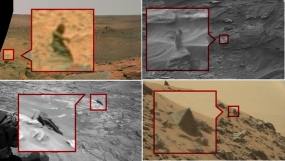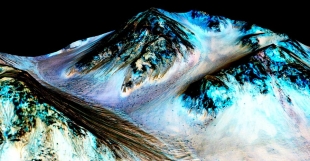The discovery of liquid and frozen water on Mars and the possibility of alien life existing on the Red Planet will help us learn more about God, Vatican's top astronomer said after the National Aeronautics and Space Administration (NASA) revealed its latest earth-shaking findings.
The director of Vatican Observatory, Jesuit Brother Guy Consolmagno, said Christians should continue to believe in God's power over the universe, although he recognised that potentially finding alien life on Mars could paint a different picture of God to some believers.
"The important thing is to recognise that the universe is created by God, and however God did it tells us something about God's personality. If God chose to make a universe where we are the only creatures, that is interesting, that tells us something about God and us," Consolmagno said, according to Vatican Radio.
"If God creates a universe where life is everywhere, that gives us a different picture of God, but in either way, we learn more about Who the Creator is," added the Vatican astronomer, who frequently comments about NASA discoveries.
Consolmagno said it is hard to speculate at this point if alien life indeed exists on the Red Planet.
"We have no idea whether life is so rare that it never occurs anywhere, or so common that is occurs everywhere, and that's why we have to look at places life could be to see just how rare or how common it actually is," he said.
Nevertheless, Consolmagno acknowledged that NASA made an exciting discovery in finding flowing water on the surface of Mars.
"You can see the traces of the rivers changing over the course of a martian year. So we are not talking about water that was there a long time ago or water that is frozen under the surface, but actual liquid water on the surface," he said.
"Of course, the air is so thin that it will evaporate right away, but it is enough water in there long enough to move stuff around," he added.
Russell Moore, president of the Ethics & Religious Liberty Commission of the Southern Baptist Convention, for his part, said that NASA's recent discovery about Mars raises a lot of questions.
"Perhaps for many of us, the images and descriptions of environments literally years away from Earth might cause a little anxiety. What all is out there? How much of it? If our little galaxy is just a pin-point in a vast, swirling universe, then why would we think that what happens on this microscopic rock matters all that much? In the sweep of cosmic space, why would your life and my life have much purpose at all?" Moore wrote in a blog post.
Moore said that in the face of all these questions, Christians should continue to look at the Holy Gospel for direction.
"The universe is meant to make us feel small, to stand in silenced awe. The Gospel, though, tells us that we have purpose and meaning, not by our strength or our power, but because we're hidden in the One who was dead, and is now alive forever, the One for whom every galaxy, seen and unseen, was made as an inheritance," he said.

















